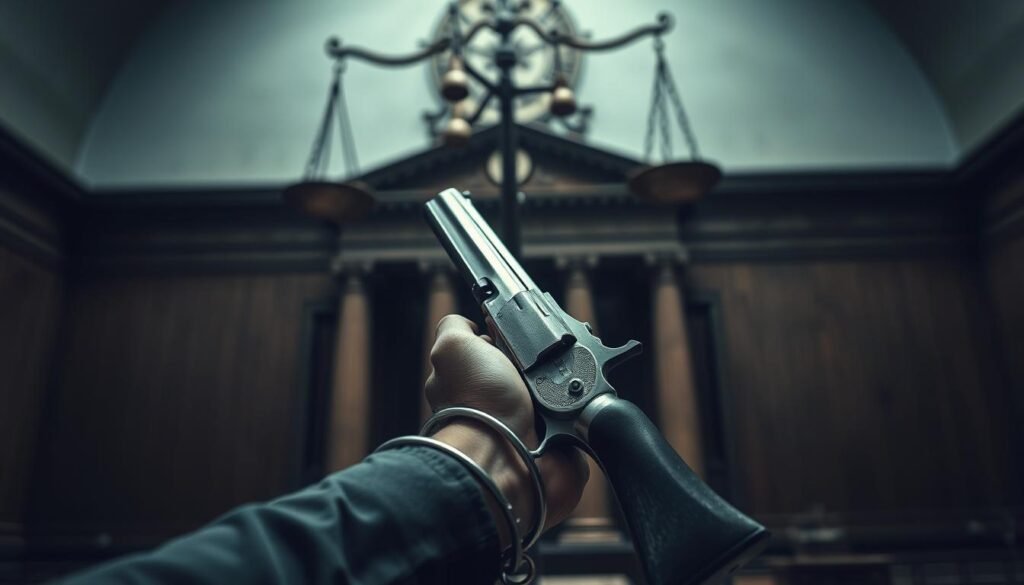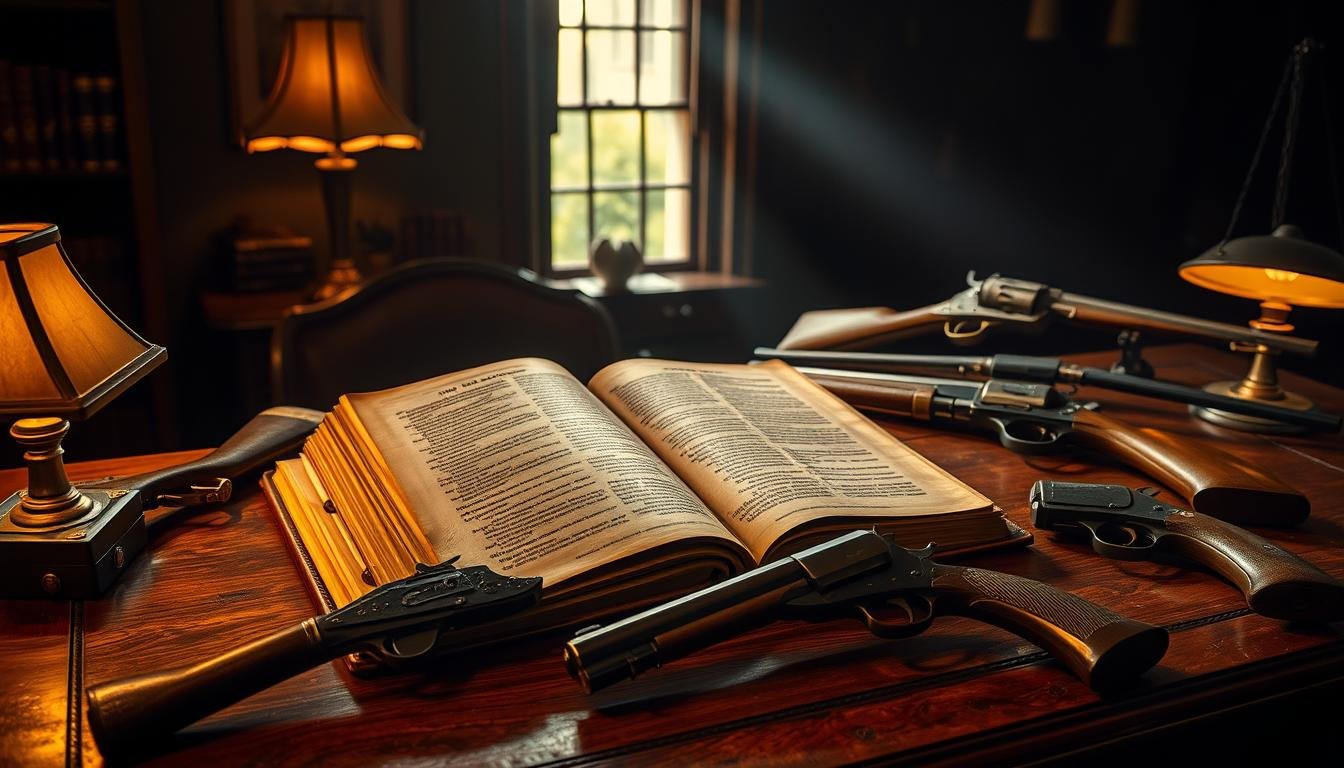Last updated on October 28th, 2025 at 03:15 pm
Can Felons Own Antique Firearms? If you’re a felon, you know about the rules on owning guns. But, the laws on antique firearms are tricky.
It’s not clear if you can have an antique gun. This depends on federal and state laws. Knowing these rules is key to making good choices.
In this article, we’ll look at the laws for felons and antique guns in the US. We aim to help you understand your rights and duties with antique firearm ownership.
Contents
- 1 Understanding Antique Firearms: Legal Definitions
- 2 Federal Firearm Laws for Convicted Felons
- 3 Can a Felon Own an Antique Firearm? The Legal Answer
- 4 State Laws vs. Federal Regulations
- 5 Verifying Antique Status of Firearms
- 6 Potential Legal Consequences for Violations
- 7 Legal Alternatives and Considerations
- 8 Conclusion: Can Felons Own Antique Firearms?
- 9 FAQ
- 9.1 What is considered an antique firearm under US law?
- 9.2 Can a convicted felon own an antique firearm?
- 9.3 Are state laws regarding antique firearms the same as federal laws?
- 9.4 How can I verify the antique status of a firearm?
- 9.5 What are the potential consequences for a felon found in possession of a firearm illegally?
- 9.6 Are there alternative options for felons who cannot possess firearms?
- 9.7 Can a felon’s firearm rights be restored?
- 9.8 What should I consider when collecting antique firearms as a felon?
Understanding Antique Firearms: Legal Definitions
Exploring the legal definitions of antique firearms shows the complexity of felon firearm ownership. To know if a felon can own an antique firearm, we must first understand what an antique firearm is.
The US Gun Control Act defines antique firearms as those made before 1899 or their replicas. But, it also lists certain firearms as antiques, no matter when they were made. This is key because it affects the legal status of the firearm.
The age of a firearm doesn’t always decide if it’s an antique. Some modern guns can be considered antiques because of their historical importance or unique features. For example, guns that use old cartridges or have special mechanics might be seen as antiques.
| Criteria | Antique Firearm Classification | Implication for Felons |
|---|---|---|
| Manufacture Date | Before 1899 or replica | Generally exempt from modern firearm regulations |
| Specific Firearms | Listed under Gun Control Act | Considered antiques regardless of manufacture date |
| Cartridge Obsolescence | Uses obsolete cartridges | May be considered an antique |
It’s crucial for felons to grasp these details if they want to own antique firearms. While federal law sets the stage, state laws can differ. This affects whether owning such firearms is legal.
Federal Firearm Laws for Convicted Felons
If you’re a convicted felon, you know about the federal laws that stop you from owning guns. These laws say you can’t have guns for life, unless your rights are given back. But, there are some exceptions, especially for old guns.
The Gun Control Act explains the rules for felons and guns. It’s made to keep guns away from those who don’t follow the law. But, it also sees the value of some guns for history or collecting.
| Category | Description | Felon Ownership Allowed |
|---|---|---|
| Modern Firearms | Firearms made after the cutoff date for antique firearms | No |
| Antique Firearms | Firearms made before the cutoff date, usually seen as antique | Yes, generally |
Remember, while federal law sets the basic rules, state laws can be different. Some states might have even stricter rules for felons and guns.It’s important to know both federal and state lawsto stay out of trouble.
Learning about felon gun laws can be tricky. But, knowing your rights and the exceptions, like for old guns, is key. [Can Felons Own Antique Firearms?]
Can a Felon Own an Antique Firearm? The Legal Answer
Whether a felon can own an antique firearm is a complex issue. It depends on specific legal criteria. Federal law has an exemption for antique firearms, but understanding this exemption is key.
To qualify for this exemption, the firearm must meet certain conditions. Understanding the Exemption Criteria is vital. Not all antique firearms are treated equally under the law. [Can Felons Own Antique Firearms?]
Understanding the Exemption Criteria
The exemption criteria for antique firearms include being made before 1899 or being a replica. However, the legal definitions can change. It’s important to check current laws for the most accurate information.
For a felon, owning an antique firearm under the exemption means it can’t be used for crime. State and local laws may also have extra rules for owning and using antique firearms.
- The firearm must be an antique or a replica.
- The possession and use must comply with state and local laws.
- The firearm cannot be used in the commission of a crime.
Given these conditions, owning an antique firearm as a felon is possible but complex. It’s important to follow all relevant laws to avoid legal trouble.
State Laws vs. Federal Regulations
State laws and federal regulations on owning guns by felons are complex and different everywhere in the US. Federal law sets a basic rule for gun ownership. But, each state can make its own rules that are stricter.
If you’re a felon, you must follow both federal and state laws about owning old guns. For example, some states don’t let felons own any guns, including old ones. Others might let you own them under certain rules.
Remember, federal law exempts old guns from its rules for felons. But, this rule doesn’t apply everywhere. You need to check your state’s laws to follow them.
It’s a good idea to talk to a lawyer who knows about gun laws at both the federal and state levels. They can help you understand what you can and can’t do with old guns.
Verifying Antique Status of Firearms
To check if a firearm is antique, you need to look at its manufacture date. Guns made before 1899 are usually considered antique. [Can Felons Own Antique Firearms?]
Next, examine the firearm’s design and features. Antique guns have unique traits that set them apart from modern ones. Getting advice from firearms experts or historians can also help confirm the gun’s age and authenticity.
| Factor | Description | Importance |
|---|---|---|
| Manufacture Date | Date the firearm was manufactured | High |
| Design and Features | Characteristics of the firearm | High |
| Expert Opinion | Consultation with firearms experts | Medium |
By following these steps and considering these factors, you can effectively verify the antique status of a firearm. This ensures you follow antique firearm laws.
See Also: Virginia Felon Voting Ban Lawsuit Challenges Restrictions
Potential Legal Consequences for Violations
Felons need to know the legal risks of owning a gun illegally. Breaking felon gun laws can mean big fines and jail time. Since felons can’t own guns, violating these rules is very serious.
Being caught with a gun illegally can lead to felony charges. This could mean more prison time and big fines. It’s key to know that US firearm regulations are strict and must be followed to avoid trouble.

It’s very important to follow the rules. Knowing and sticking to both state and federal gun laws is crucial. This includes knowing about antique guns, as felons can’t own them in some cases.
To stay out of legal trouble, learn about the current laws. Talking to a lawyer can help you understand your situation. They can make sure you’re following US firearm regulations.
Legal Alternatives and Considerations
As a felon, owning firearms might be off-limits. But, there are legal ways to enjoy shooting. You can join shooting ranges or take firearm safety courses. These places let you handle guns safely and legally.
Collecting antique firearms that can’t be used is another option. This way, you can learn about firearms history while following the law. Make sure to check your state’s rules on antique guns and confirm they’re not working.
Exploring these alternatives means knowing the local laws well. It’s smart to talk to a lawyer to make sure you’re doing things right. [Can Felons Own Antique Firearms?]
Conclusion: Can Felons Own Antique Firearms?
Knowing if you can own an antique firearm as a felon is key to avoiding legal trouble. The rules about antique guns are complex. They involve both federal and state laws.
Federal laws usually don’t restrict antique guns, but state laws can differ. You need to check if a gun is truly antique. Also, you must know your state’s specific laws to follow them.
Learning about antique gun laws helps you make smart choices. If you want to own an antique gun, you must understand the legal side. This includes knowing the possible penalties for breaking these laws.
Being up-to-date on antique gun laws for felons is important. It helps you make good choices about your belongings. This knowledge is crucial for navigating the complex world of antique firearms.
See Also: Can a Felon Get TSA PreCheck Approval?
FAQ
What is considered an antique firearm under US law?
The US Gun Control Act defines antique firearms. They are guns made before 1899 or their exact replicas. Some guns are considered antiques, no matter when they were made.
Can a convicted felon own an antique firearm?
Yes, felons can own antique firearms under certain rules. This includes guns made before 1899 or their replicas.
Are state laws regarding antique firearms the same as federal laws?
No, state laws differ from federal ones. As a felon, knowing your state’s laws is crucial. They might be stricter. [Can Felons Own Antique Firearms?]
How can I verify the antique status of a firearm?
To check if a gun is antique, look up its make date. Also, examine its design and features. You can also ask firearms experts for help.
What are the potential consequences for a felon found in possession of a firearm illegally?
Being caught with an illegal gun can lead to big fines and jail time. You might also face other penalties under state and federal laws.
Are there alternative options for felons who cannot possess firearms?
Yes, felons can still enjoy shooting sports. They can go to shooting ranges or take firearm safety courses. They can also collect antique guns that can’t shoot, following local rules.
Can a felon’s firearm rights be restored?
Yes, in some cases, felons can get their gun rights back. But, this depends on the state and specific rules. [Can Felons Own Antique Firearms?]
What should I consider when collecting antique firearms as a felon?
As a felon, make sure any antique guns you collect can’t shoot. Also, follow state and federal laws about owning and showing them. [Can Felons Own Antique Firearms?]

Van Maldonado, born in California, holds a degree in Criminology and Police Science. Currently serving as an investigative officer at a local police station, he spends his leisure time writing insightful content for FelonScope.com.

